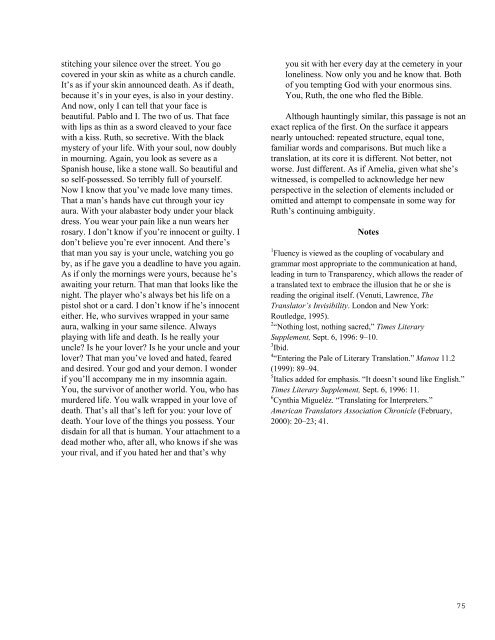their - The University of Texas at Dallas
their - The University of Texas at Dallas
their - The University of Texas at Dallas
You also want an ePaper? Increase the reach of your titles
YUMPU automatically turns print PDFs into web optimized ePapers that Google loves.
stitching your silence over the street. You go<br />
covered in your skin as white as a church candle.<br />
It’s as if your skin announced de<strong>at</strong>h. As if de<strong>at</strong>h,<br />
because it’s in your eyes, is also in your destiny.<br />
And now, only I can tell th<strong>at</strong> your face is<br />
beautiful. Pablo and I. <strong>The</strong> two <strong>of</strong> us. Th<strong>at</strong> face<br />
with lips as thin as a sword cleaved to your face<br />
with a kiss. Ruth, so secretive. With the black<br />
mystery <strong>of</strong> your life. With your soul, now doubly<br />
in mourning. Again, you look as severe as a<br />
Spanish house, like a stone wall. So beautiful and<br />
so self-possessed. So terribly full <strong>of</strong> yourself.<br />
Now I know th<strong>at</strong> you’ve made love many times.<br />
Th<strong>at</strong> a man’s hands have cut through your icy<br />
aura. With your alabaster body under your black<br />
dress. You wear your pain like a nun wears her<br />
rosary. I don’t know if you’re innocent or guilty. I<br />
don’t believe you’re ever innocent. And there’s<br />
th<strong>at</strong> man you say is your uncle, w<strong>at</strong>ching you go<br />
by, as if he gave you a deadline to have you again.<br />
As if only the mornings were yours, because he’s<br />
awaiting your return. Th<strong>at</strong> man th<strong>at</strong> looks like the<br />
night. <strong>The</strong> player who’s always bet his life on a<br />
pistol shot or a card. I don’t know if he’s innocent<br />
either. He, who survives wrapped in your same<br />
aura, walking in your same silence. Always<br />
playing with life and de<strong>at</strong>h. Is he really your<br />
uncle Is he your lover Is he your uncle and your<br />
lover Th<strong>at</strong> man you’ve loved and h<strong>at</strong>ed, feared<br />
and desired. Your god and your demon. I wonder<br />
if you’ll accompany me in my insomnia again.<br />
You, the survivor <strong>of</strong> another world. You, who has<br />
murdered life. You walk wrapped in your love <strong>of</strong><br />
de<strong>at</strong>h. Th<strong>at</strong>’s all th<strong>at</strong>’s left for you: your love <strong>of</strong><br />
de<strong>at</strong>h. Your love <strong>of</strong> the things you possess. Your<br />
disdain for all th<strong>at</strong> is human. Your <strong>at</strong>tachment to a<br />
dead mother who, after all, who knows if she was<br />
your rival, and if you h<strong>at</strong>ed her and th<strong>at</strong>’s why<br />
you sit with her every day <strong>at</strong> the cemetery in your<br />
loneliness. Now only you and he know th<strong>at</strong>. Both<br />
<strong>of</strong> you tempting God with your enormous sins.<br />
You, Ruth, the one who fled the Bible.<br />
Although hauntingly similar, this passage is not an<br />
exact replica <strong>of</strong> the first. On the surface it appears<br />
nearly untouched: repe<strong>at</strong>ed structure, equal tone,<br />
familiar words and comparisons. But much like a<br />
transl<strong>at</strong>ion, <strong>at</strong> its core it is different. Not better, not<br />
worse. Just different. As if Amelia, given wh<strong>at</strong> she’s<br />
witnessed, is compelled to acknowledge her new<br />
perspective in the selection <strong>of</strong> elements included or<br />
omitted and <strong>at</strong>tempt to compens<strong>at</strong>e in some way for<br />
Ruth’s continuing ambiguity.<br />
Notes<br />
1 Fluency is viewed as the coupling <strong>of</strong> vocabulary and<br />
grammar most appropri<strong>at</strong>e to the communic<strong>at</strong>ion <strong>at</strong> hand,<br />
leading in turn to Transparency, which allows the reader <strong>of</strong><br />
a transl<strong>at</strong>ed text to embrace the illusion th<strong>at</strong> he or she is<br />
reading the original itself. (Venuti, Lawrence, <strong>The</strong><br />
Transl<strong>at</strong>or’s Invisibility. London and New York:<br />
Routledge, 1995).<br />
2 “Nothing lost, nothing sacred,” Times Literary<br />
Supplement, Sept. 6, 1996: 9–10.<br />
3 Ibid.<br />
4 “Entering the Pale <strong>of</strong> Literary Transl<strong>at</strong>ion.” Manoa 11.2<br />
(1999): 89–94.<br />
5 Italics added for emphasis. “It doesn’t sound like English.”<br />
Times Literary Supplement, Sept. 6, 1996: 11.<br />
6 Cynthia Migueléz. “Transl<strong>at</strong>ing for Interpreters.”<br />
American Transl<strong>at</strong>ors Associ<strong>at</strong>ion Chronicle (February,<br />
2000): 20–23; 41.<br />
75

















